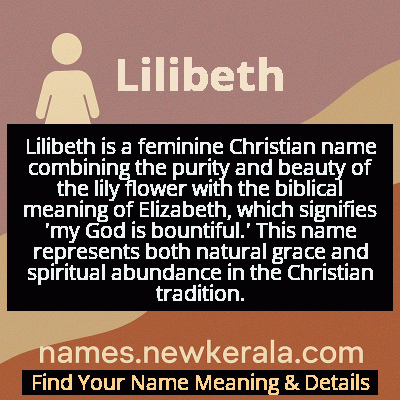Lilibeth Name Meaning & Details
Origin, Popularity, Numerology Analysis & Name Meaning of Lilibeth
Discover the origin, meaning, and cultural significance of the name LILIBETH. Delve into its historical roots and explore the lasting impact it has had on communities and traditions.
Name
Lilibeth
Gender
Female
Origin
Christian
Lucky Number
5
Meaning of the Name - Lilibeth
Lilibeth is a feminine Christian name combining the purity and beauty of the lily flower with the biblical meaning of Elizabeth, which signifies 'my God is bountiful.' This name represents both natural grace and spiritual abundance in the Christian tradition.
Lilibeth - Complete Numerology Analysis
Your Numerology Number
Based on Pythagorean Numerology System
Ruling Planet
Mercury
Positive Nature
Adventurous, dynamic, curious, and social.
Negative Traits
Restless, impatient, inconsistent, prone to indulgence.
Lucky Colours
Green, white.
Lucky Days
Wednesday.
Lucky Stones
Emerald.
Harmony Numbers
1, 3, 9.
Best Suited Professions
Sales, marketing, travel, entertainment.
What People Like About You
Versatility, charisma, adventurous spirit.
Famous People Named Lilibeth
Lilibeth Foster
Film Producer
Academy Award-nominated documentary filmmaker known for socially conscious films
Lilibeth Cuenca Rasmussen
Visual Artist
Danish-Filipino performance artist known for exploring cultural identity and gender issues
Lilibeth Leopard
Musician
American singer-songwriter and member of the indie folk band The Secret Sisters
Name Variations & International Equivalents
Click on blue names to explore their detailed meanings. Gray names with will be available soon.
Cultural & Historical Significance
The name carries particular resonance in Catholic and Protestant communities where both floral imagery and biblical names hold significant cultural weight. In Christian symbolism, the lily is often associated with the Virgin Mary's purity and the resurrection of Christ, while Elizabeth connects to John the Baptist's mother in the New Testament. This combination makes Lilibeth a popular choice for parents seeking a name that balances spiritual depth with aesthetic appeal, representing both divine grace and natural beauty in Christian naming traditions.
Extended Personality Analysis
Individuals named Lilibeth are often perceived as possessing a unique blend of grace and strength, reflecting the dual nature of their name. The 'Lily' component suggests someone with natural elegance, purity of intention, and artistic sensitivity, while the 'Elizabeth' heritage implies resilience, faith, and abundance of spirit. This combination typically results in a personality that is both gentle and determined—someone who approaches life with both sensitivity and conviction.
They often demonstrate strong intuitive abilities and emotional intelligence, making them excellent mediators and compassionate friends. The name suggests a person who values beauty in all forms while maintaining deep-rooted principles and spiritual awareness. Their dual nature allows them to navigate both creative pursuits and practical responsibilities with equal competence, often becoming well-rounded individuals who inspire trust and admiration in others. People with this name tend to be nurturing yet independent, combining traditional values with modern perspectives in a way that makes them adaptable yet grounded.
Modern Usage & Popularity
Lilibeth maintains steady but modest usage in contemporary naming practices, particularly in English-speaking countries with strong Christian traditions. While never reaching the popularity charts' upper echelons, it has experienced periodic resurgences, often influenced by celebrity usage or cultural trends favoring vintage and compound names. The name saw increased attention following the birth of Lilibet Diana Mountbatten-Windsor, daughter of Prince Harry and Meghan Markle, in 2021. Current usage trends show it as a distinctive choice for parents seeking a name that feels both traditional and unique, with particular appeal to those valuing floral names with biblical connections. Its usage remains most common in the United States, United Kingdom, Canada, and Australia, with growing interest in Latin American countries where the Spanish pronunciation flows naturally.
Symbolic & Spiritual Meanings
Lilibeth carries rich symbolic meaning derived from its dual components. The lily represents purity, renewal, and the soul's restored innocence, often associated with the Virgin Mary in Christian iconography. It symbolizes transition and the cycle of life, death, and rebirth. Combined with Elizabeth's meaning of divine abundance and God's promise, the name becomes a powerful symbol of spiritual grace meeting earthly beauty. Metaphorically, Lilibeth represents the harmonious union of nature and faith—the delicate beauty of the natural world infused with divine purpose and abundance. It suggests someone who embodies both the transient beauty of flowers and the eternal promise of spiritual fulfillment, creating a symbolic bridge between the ephemeral and the eternal, the human and the divine.

